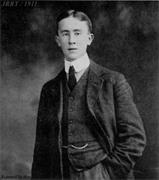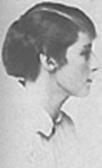Топик: Корни персонажей Д.Р.Р.Толкиена
In order to prevent Ronald from walking several miles between the countryside home and school, the Tolkiens moved from Sarehole to Birmingham.
Due to school conflicts, Ronald Tolkien was transferred to King Phillip's Academy for a short period.
Tolkien learns some philology
". . . he especially remembered 'the bitter disappointment and disgust from schooldays with the shabby use made in Shakespeare of the coming of 'Great Birnam Wood to high Dunisiane hill'; 'I longed to devise a setting by which the trees might really march to war" (Carpenter 28)
"By inclination, his form-master Brewerton was a medievalist . . . if a boy employed the term 'manure' Brewerton would roar out: 'Manure? Call it muck! Say it three times! Muck, muck muck!'. He encouraged his students to read Chaucer, and he recited the Canterbury Tales to them in the original Middle English. To Ronald Tolkien's ears, this was a revelation, and he determined to learn more about the history of the language." (Carpenter 28)
Tolkien's mother dies
"The New Year [1904] did not begin well. Ronald and Hilary were confined to bed with measles followed by whooping-cough, and in Hilary's case by pneumonia. The addition strain of nursing them proved too much for their mother, and as she feard it proved 'impossible to go on'. By April 1904 she was in hospital, and her condition was diagnosed as diabetes." (Carpenter 29)
"At the beginning of November 1904, she sank into a diabetic coma, and six days later, on November 14, she died." (Carpenter 30)
". . . Perhaps his mother's death also had a cementing effect on his study of languages. It was she, after all, who had been his first teacher and who had encouraged him to take an interest in words. Now that she was gone he would pursue that path relentlessly. And certainly the loss of his mother had a profound effect on his personality. It made him into a pessimist . . . Nothing was safe. Nothing would last. No battle would be won for ever." (Carpenter 31)
Related to philosophy of THE LORD OF THE RINGS: Middle-Earth is never, ever free from evil. The Simillirion states that Middle-Earth is destroyed and all live in Valinor (quasi Middle-Earth) after the death of Morgroth (by Turin, son of Thor).
Tolkien lives with his mother's aunt-in-law (in urban Edgbaston) along with his brother Hillary.
"His feelings towards the rural landscape, already sharp from the earlier severance that had taken him from Sarehole, now become emotionally charged with personal bereavement. This love for the memory of the countryside of his youth was later to become a central part of his writing, and it was intimately bound up with his love for the memory of his mother." (Carpenter 32-3)
Tolkien in high school
 "Headmaster Gilson also encouraged his pupils to make a detailed study of classical linguistics. This was entirely in keeping with Tolkien's inclinations; and, partly as a result in the general principles of language" (Carpenter 34)
"Headmaster Gilson also encouraged his pupils to make a detailed study of classical linguistics. This was entirely in keeping with Tolkien's inclinations; and, partly as a result in the general principles of language" (Carpenter 34)
 "It was one thing to know Latin, Greek, French, and German; it was another to understand why they were what they were. Tolkien had started to look for the bones, the elements that were common to them all: he had begun, in fact, to study philology, the science of words." (Carpenter 34)
"It was one thing to know Latin, Greek, French, and German; it was another to understand why they were what they were. Tolkien had started to look for the bones, the elements that were common to them all: he had begun, in fact, to study philology, the science of words." (Carpenter 34)
Tolkien studies all languages (Studies Chaucer, Beowulf, Old Norse, Gothic)
 "He continued his search for the 'bones' behind all these languages, rummaging in the school library and exploring the remoter shelves of Cornish's bookshop down the road. Eventually he began to find - and to scrape enough money to buy - German books on philology that were 'dry-as-dust' but which could provide the answers to his questions. Philology: 'the love of words'. For that was what motivated him. It was not an arid interest in the scientific principles of language; it was a deep love for the look and sound of words, springing from the days when his mother had given him his first Latin lessons . . . And as a result of this love of words, he had started to invent his own words" (Carpenter 35) Tolkien begins to (at age 14) to create his own languages, namely 'Nevbosh', a language filled with Gothic and Norse words.
"He continued his search for the 'bones' behind all these languages, rummaging in the school library and exploring the remoter shelves of Cornish's bookshop down the road. Eventually he began to find - and to scrape enough money to buy - German books on philology that were 'dry-as-dust' but which could provide the answers to his questions. Philology: 'the love of words'. For that was what motivated him. It was not an arid interest in the scientific principles of language; it was a deep love for the look and sound of words, springing from the days when his mother had given him his first Latin lessons . . . And as a result of this love of words, he had started to invent his own words" (Carpenter 35) Tolkien begins to (at age 14) to create his own languages, namely 'Nevbosh', a language filled with Gothic and Norse words.
![]() 1908 - Tolkien falls in love with Edith Bratt
1908 - Tolkien falls in love with Edith Bratt
1911 - Tolkien starts the Tea Club and goes to Switzerland
Tolkien in Oxford
In 1911 Tolkien entered Exeter College of Oxford. There he started writing (poem 'Wood-sunshine'), modeled after several different authors.
"In 'Wood-sunshine' there is a distinct resemblance to an episode in the first part of Thompson's 'Sister Songs' where the poet sees first a single elf and then a swarm of woodland sprites in the glade; when he moves, they vanish . . ." (Carpenter 48)
"Being taught by Joe Wright, Tolkien managed to find books of medieval Welsh, and he began to read the language that had fascinated him since he saw a few words of it on coal-trucks. He was not disappointed; indeed he was confirmed in all his expectations of beauty. Beauty: that was what pleased him in Welsh; the appearance and sound of the words almost irrespective of their meaning. He once said: 'Most English-speaking people, for instance, will admit that cellar door is 'beautiful', especially if disassociated from its sense (and its spelling). More beautiful than, say sky, and far more beautiful than beautiful'." (Carpenter 56-7)
Tolkien starts advanced languages (new): "He abandoned neo-Gothic and began to create a private language that was heavily influenced by Finnish. This was the language that would eventually emerge in his stories as 'Quenya' or High-elven. That would not happen for many years; yet already a seed of what was to come was germinating in his mind" (Carpenter 59)
1913 - Tolkien graduates from three-year program with second-class honors and proceeds to study philology in graduate school.
At the same period Tolkien reads Cynewulf - "'I felt a curious thrill,' he wrote long afterwards, 'as if something had stirred in me, half wakened from sleep. There was something very remote and strange and beautiful behind those words, if I could grasp it, far beyond ancient English'." (Carpenter 64) Tolkien reads the Völuspa - "The most remarkable of all Germanic-mythological poems, it dates from the very end of Norse heathendom, when Christianity was taking the place of the old gods; yet it imparts a sense of living myth, a feeling of awe and mystery, in its representation of a pagan cosmos. It had a profound appeal to Tolkien's imagination" (Carpenter 65) Tolkien sees Edith again (he was previously banned to see him by Father Francis, his guardian)
Tolkien reads Morris (NOTE: Mirkwood is the name of the great Necromancer's forest in The Hobbit and the Lord of the Rings trilogy) "Written partly in prose and partly in verse, [Morris's book] centers on a House or family-tribe that dwells by a great river in a clearing of the forest named Mirkwood, a name taken from ancient Germanic geography and legend. Many elements in the story seem to have impressed Tolkien. It's style is highly idiosyncratic, heavily laden with archaisms and poetic inversions in an attempt to recreate the aura of ancient legend. Clearly Tolkien took not of this, and it would seem that he also appreciated another facet of the writing: Morris' aptitude, despite the vagueness of time and place in which the story is set, for describing with great precision the details of his imagined landscape. Tolkien himself was to follow Morris' example in later year." [Carpenter 70]
In the same year Tolkien visits Cornwall [NOTE: This is the location for the Sea in The Hobbit and LOTR] " 'Nothing I could say . . . could describe it to you. The sun beats down on you and a huge Atlantic swell smashes and spouts over the snags and reefs. The sea has carved weird wind-holes and spouts into the cliffs which blow with trumpety noises or spout foam like a whale, and everywhere you see black and red rock and white foam against violet and transparent seagreen.'." [Carpenter 70]
Tolkien begins to create works with Quentya (language of the high-elves): "He had been working for some time at the language that was influenced by Finish, and by 1915 he had developed it to a degree of some complexity. He felt that it was 'a mad hobby', and he scarcely expected to find an audience for it. But he sometimes wrote poems n it, and the more he worked at it the more he felt that it needed a 'history' to support it. In other words, you cannot have a language without a race of people to speak it. He was perfecting the language; now he had to decide to whom it belonged." [Carpenter 75]